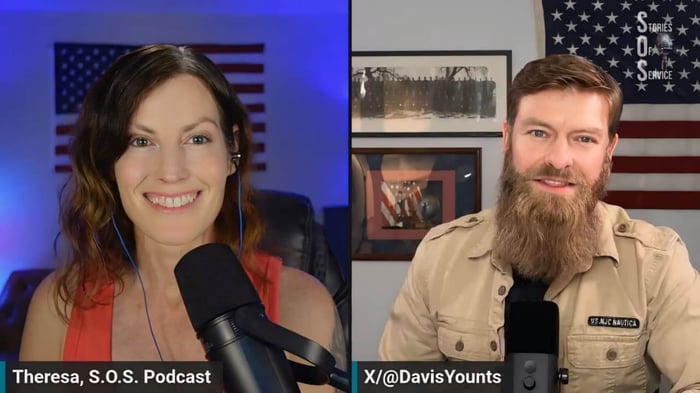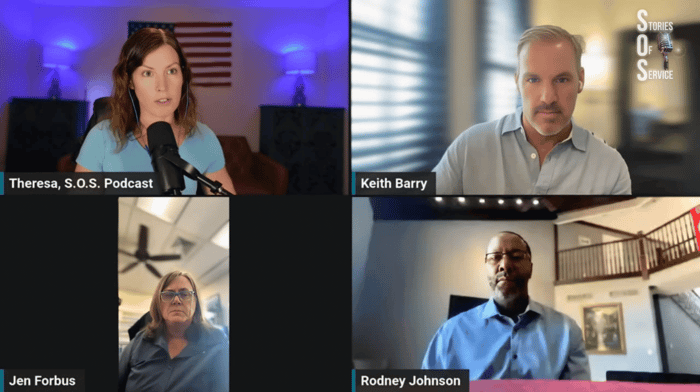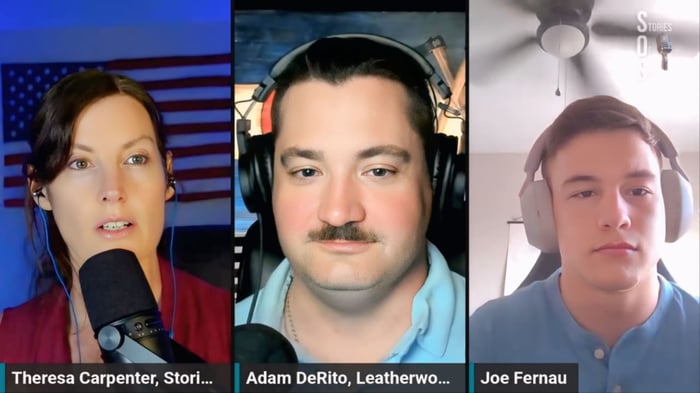Table of Contents
Whistleblower vs. The Military Machine: Sgt. Lindstrom’s Shocking Update. Imagine getting fired — and knowing it was unjust. Imagine starting a years-long legal fight against the very system that once called you a brother-in-arms. Now imagine doing it alone, without an attorney, standing up to powerful institutions determined to silence you.
That’s the story of Sergeant Andrew “Andy” Lindstrom, a United States Marine Corps veteran and former Nevada National Guardsman, who became his own lawyer after reporting sexual misconduct, financial fraud, and retaliation within the Nevada National Guard.
This episode of the Stories of Service podcast, hosted by Theresa Carpenter, brings Andy back for his third appearance, updating listeners on his three-year legal battle with the State of Nevada and the National Guard — and the personal toll of choosing integrity over comfort.
GUEST BIO: WHO IS ANDREW LINDSTROM?
 Andrew "Andy" Lindstrom
Andrew "Andy" Lindstrom
Andy Lindstrom served proudly in the U.S. Marine Corps before joining the Nevada National Guard, where he worked both as a Guardsman and a state IT employee in Carson City. His civilian role involved maintaining electronic security systems for weapons vaults and surveillance servers, critical to base operations.
But Lindstrom’s story isn’t one of a quiet technician. It’s a story of a man who saw corruption — and refused to look away.
He witnessed patterns of fraternization, sexual harassment cover-ups, and payroll fraud involving senior Guard personnel and state employees. When he tried to report these issues, the system didn’t thank him. It turned against him.
Within months, Lindstrom was terminated under vague claims that he “wasn’t a good fit.” What followed was a three-year legal odyssey, where he represented himself pro se — without an attorney — against the combined resources of the Nevada Attorney General’s Office and Nevada National Guard legal staff.
From Whistleblower to Target
Lindstrom first began raising red flags as early as 2013, when he noticed misconduct among officers and enlisted soldiers. Fraternization between ranks — openly visible in field environments — went unpunished for some but was selectively enforced when convenient.
He also uncovered state-level payroll fraud, in which retired high-ranking personnel received inflated salaries for work they rarely performed. In one case, Lindstrom estimated over $100,000 in unearned pay over several years.
When he reported these issues, he became a target. The hostility culminated in 2022, when a defamatory sign appeared near a National Guard facility. Despite no evidence, Lindstrom was accused of placing it.
An 84-page internal investigation followed — one that, according to Lindstrom, was hidden and later misrepresented by the Attorney General’s office as an “inquiry” rather than an “investigation.”
He was ultimately fired without cause, told only that he “wasn’t a good fit.”
Three Years of Legal Stonewalling
By law, Nevada’s state employees are entitled to a whistleblower hearing within 30 days of filing an appeal. For Andy, it took three years.
He described an exhausting cycle of delays, evasions, and procedural gamesmanship, as the state used dilatory tactics to avoid scrutiny. Witnesses went missing, subpoenas were dodged, and records were withheld.
One senior Guard attorney even left the state to avoid being served a subpoena — an extraordinary move in any legal proceeding. Another witness, the investigating officer, allegedly fled to Washington, D.C.
Despite these obstacles, Andy meticulously documented every communication, filing, and legal motion — doing the work of an entire defense team by himself.
A Day in “Court” — and a System Protecting Itself
In July 2025, Andy finally got his day before a state hearing officer — a retired deputy attorney general under contract with the state.
The conflict of interest was clear: these hearing officers work for the same state they are asked to rule against. If they deliver decisions unfriendly to the government, their contracts can be terminated.
Knowing the odds, Lindstrom made a strategic choice not to testify. He believed the hearing was rigged, describing the process as a “gotcha game” of entrapment questions designed to discredit him.
Three witnesses key to his case failed to appear, and the hearing officer took no action.
In the final ruling, the officer even praised Lindstrom, writing that he had done an “admirable job presenting his case.” Yet the verdict still went against him, claiming he had failed to prove “illegal or improper conduct by a state employee.”
For Lindstrom, the message was clear: the system protects itself.
Personal Toll and Courage in Isolation
Behind the legal jargon lies a deeply human cost. Andy lost not just his job, but his financial stability, professional reputation, and mental peace. He spent years facing bureaucratic stonewalls and retaliatory behavior — alone.
He also discovered that some of his personal computer equipment had been tampered with, with operating systems wiped clean. As a cybersecurity PhD student, he knew what that meant — and what it implied about how far his adversaries were willing to go.
Still, Lindstrom continues to fight, appealing to both federal courts and the court of public opinion. His story isn’t just about his own vindication — it’s about exposing a system where accountability depends more on politics than justice.
Listen Here
Watch Full Episode
Why His Story Matters
Andy’s experience highlights a dangerous paradox within military and government institutions: those sworn to uphold integrity often punish the people who live by it.
His story resonates far beyond Nevada. It speaks to every service member, employee, or citizen who’s ever faced retaliation for doing the right thing.
By coming forward, Lindstrom joins a growing chorus of veterans and whistleblowers calling for reform, transparency, and real due process — especially in environments where the chain of command can easily silence dissent.
Key Takeaways
🔹 Whistleblowers need protection. The absence of independent oversight in state-military systems allows corruption to thrive unchecked.
🔹 Retaliation is real. Reporting misconduct often leads to professional and personal attacks, especially when leaders fear exposure.
🔹 Pro se courage matters. Andy’s case proves that ordinary people can challenge entrenched power, even without institutional backing.
🔹 Systemic reform is overdue. When hearing officers and investigators work for the same entities they’re judging, justice becomes performative.
🔹 Resilience inspires change. Despite years of adversity, Lindstrom’s persistence underscores the enduring value of integrity and accountability.
If you care about truth, due process, and accountability in our military institutions, Andy Lindstrom’s story is one you won’t forget. His fight reminds us that real courage isn’t only found on the battlefield — sometimes, it’s found in a courtroom, standing alone.
Resources & Links
📺 KTNV Investigative Report – Guarding the Guardsmen: Watch here (https://www.ktnv.com/13-investigates/...)
⚖️ Case Info – Lindstrom v. Nevada State Militia: View on Justia (https://dockets.justia.com/docket/nev...)
🤝 Support Andy – Veteran Sisters (https://veteransisters.org/m/create-a...)
👥 Join the Conversation
Military Whistleblower Support Group (Facebook) ( / militarywhistleblowers )
S.O.S. Podcast Homepage (https://goodpods.com/podcasts/sos-sto...
FAQs
What did Andy Lindstrom expose in the Nevada National Guard?
Lindstrom reported multiple forms of misconduct, including sexual harassment cover-ups, payroll fraud, and fraternization among senior personnel. He also identified failures in internal accountability systems and retaliation against those who tried to report wrongdoing.
Why did Andy Lindstrom represent himself in court?
After being terminated, Lindstrom struggled to find legal representation willing to take on the state and National Guard establishment. Rather than give up, he chose to represent himself pro se, filing his own motions, subpoenas, and appeals to seek justice.
What was the outcome of his whistleblower case?
After years of delays and procedural obstacles, a state hearing officer ruled against Lindstrom in 2025 — despite acknowledging that he did an “admirable job” presenting his case. Key witnesses failed to appear, and the hearing revealed significant conflicts of interest, as the state’s legal system largely protected its own employees.
What is the significance of Andy Lindstrom’s case?
Lindstrom’s story exposes how state and military institutions can suppress accountability when corruption or misconduct is reported internally. His case underscores the need for independent oversight, transparent investigations, and stronger whistleblower protections for both military and civilian employees.
How did the legal system fail Andy Lindstrom?
Lindstrom’s whistleblower appeal took three years — far beyond the 30-day requirement under Nevada law. State investigators misclassified his complaint, witnesses evaded subpoenas, and hearing officers under state contract faced inherent bias when ruling on cases involving their employer.
What reforms does Andy Lindstrom advocate for?
Lindstrom calls for:
Independent whistleblower review boards outside state or Guard influence.
Transparency in internal investigations with public access to findings.
Accountability for legal and military personnel who engage in retaliation or obstruction.
Stronger due process protections for government employees.
Where is Andy Lindstrom now?
As of 2025, Andy resides in Nevada, continuing his advocacy for whistleblower rights while pursuing advanced studies in cybersecurity and digital forensics. He remains active in the veteran community and speaks publicly about the importance of truth and accountability in government systems.






